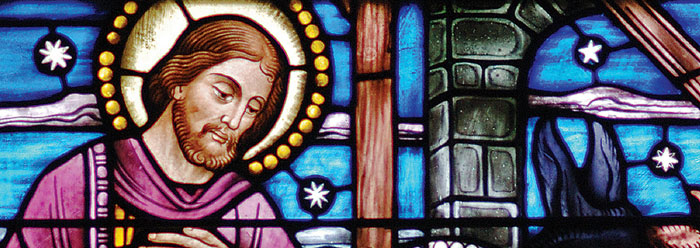Have you ever wondered why the angels announced the birth of Jesus Christ to shepherds? Are you a bit curious about what drove the wise men to travel all the way from "the east"? Why Mary and Joseph for His earthly parents? Surely there were other Davidic descendants living at that time. And Simeon and Anna--why were they chosen to play a part in this event?
Then there was wicked King Herod and the self-righteous, hypocritical Pharisee sycophants who fawned on him. Why did God let them know that the Son of God had come into the world? What common denominator did the sovereign Creator use to select these human "stars" in this most unique drama in history?
Perhaps the most simple and profound spiritual test for an individual is where he or she stands concerning "belief of the truth" (2 Thessalonians 2:13). Just how the truth of the written Word (John 17:17) is wrapped up in the living Word (John 1:1-3, 14; 14:6) is an eternal mystery that can be believed, but never totally understood. Yet it is that truth that came into being when the eternal Son of God became the incarnate Son of man.
Mary and Joseph
Although they both met the genealogical and biblical requirements of the Davidic line (Joseph from Solomon with legal right, and Mary from Nathan with spiritual right), the more important character trait was their response to God's messenger, Gabriel.
And Mary said, Behold the handmaid of the Lord; be it unto me according to thy word. (Luke 1:38)
Then Joseph being raised from sleep did as the angel of the Lord had bidden him. (Matthew 1:24)
Both were given astounding news that was humanly impossible to comprehend--and humanly costly to accept--yet they did not hesitate to believe and act immediately on the instructions they were given.
The Shepherds
Common, ordinary men, far from the "power people" of the day, on a routine job in the still of the night, were suddenly confronted with the stunning glory of the angel of the Lord. Their fear calmed by the angel's words, they heard the announcement of the fulfillment of the hope that lived in every believing Jewish heart--the Messiah had come!
After their physical hearts had calmed down, they turned to each other and said:
Let us now go even unto Bethlehem, and see this thing which is come to pass, which the Lord hath made known unto us. And they came with haste. (Luke 2:15-16)
Not only did they gladly accept the word given, but they "came with haste"--they acted immediately on the information. Just like Mary and Joseph had.
Simeon and Anna
About a month after the circumcision of the infant Lord Jesus, Mary and Joseph came to the temple to offer a sacrifice according to the Law of Moses (Leviticus 12).
Simeon (the Bible just calls him "a man," giving him no special title or function) was a "just and devout" man who had yielded himself so completely to the Holy Spirit that he was told that he would not die before he saw the fulfillment of his faith. Responding to the Spirit's prompting, Simeon arrived at the temple just as Mary and Joseph came to present the Lord Jesus (Luke 2:27). Then, filled with the joy of the moment and under the Spirit’s guidance, Simeon was used to pronounce a blessing and a prophecy (Luke 2:28-35).
Anna, over 100 years old, had been serving God as a prophetess and prayer warrior in the temple for many years. Coming "in that instant" (Luke 2:38), Anna uttered a prayer of thanksgiving and then went on to tell anyone who would listen of the wonder of Christ’s coming.
Once again, both these dedicated people, responding to the word God had given them, acted immediately to obey and spread the truth.
The Wise Men
There are many Old Testament prophecies that speak to some event in the earthly life of Jesus Christ. Quite a few center on His birth, some of which, no doubt, were familiar to the Magi and were part of the motivation that started them on their long trek to find this "King of the Jews" (Matthew 2:2).
These men were the scholars of Persia, and would have had access to the writings of Daniel and the commentaries of the Talmud of Babylon. Coupled with their astronomical calculations, they had determined that the fulfillment of Daniel's "seventy weeks" was soon to climax in the coming of the Messiah, although they were not aware of the Bethlehem prophecy of Micah 5:2.
Again, acting immediately on the limited knowledge they had, they sought answers from the leaders in Jerusalem. When pointed to Bethlehem, they found the home of Mary and Joseph, worshiped the Lord Jesus with honor and gifts, and then responded to the dream from God warning them to return "another way" (Matthew 2:12).
King Herod
This sensually wicked and debauched king knew nothing of the Scriptures of his own people, and had only thoughts of murder toward any perceived threat to his rule and way of life. When told of the prophecies and the refusal of the Magi to participate in his deceptive plot, Herod responded with the slaughter of all boys under the age of two in Bethlehem (Matthew 2:16).
There was no "love of the truth" in Herod (2 Thessalonians 2:10)! Like Cain of old, he was "of that wicked one" (1 John 3:12) and reacted with rage and murder. Truth demands action. One cannot be neutral toward truth; it either invokes a love for it or a hatred toward it (John 3:19-21). Herod, already habitually wicked, plummeted to the depths of evil and acted on his passion.
The Pharisees
These men were the conservative religious leaders and scholars of their day. They knew the Scriptures. They led the nation of Israel spiritually and set the standards for "holy" behavior. Of all the human participants in the drama of the Incarnation, they should have known the truth and embraced it gladly.
Yet they chose affluence and influence above obedience and reverence. Rather than follow the clear teachings of the Scriptures (which they knew intimately), they chose to follow the distorted and complicated reasoning of men (the Talmud) which allowed them to afflict their people with "heavy burdens and grievous to be borne" (Matthew 23:4) and use their traditions to make "the commandment of God of none effect" (Matthew 15:6).
The Lord Jesus gave His most harsh criticisms to these men. They knew truth, but chose to disobey. They could have responded in righteousness, but willingly turned away from truth, and then did all they could to make their disciples follow their error.
Reaction to the Gospel Today
Foundational to the "everlasting gospel" is worship of the Creator (Revelation 14:6-7) who has become our Savior through His death, burial, and resurrection "according to the Scriptures" (1 Corinthians 15:3-4). In many churches today, while the "love" message of the gospel is blended into palatable syrup that can be fed to anyone (Christian or non-Christian), the "repentance" and "new creation" parts of the gospel are either ignored or distorted into a hybrid that is compatible with evolutionary humanism.
The positive and negative responses to the gospel by those in Jesus' day are precisely the same reactions seen among people today. But only belief in the truth can lead to salvation and bring a soul from death unto life. May God grant you His peace through His Son as we celebrate the greatest gift this Christmas season.
* Dr. Morris is Chief Executive Officer of the Institute for Creation Research.
Cite this article: Morris III, H. 2008. The Human "Stars" of Christmas. Act & Facts. 37 (12): 4-5.














